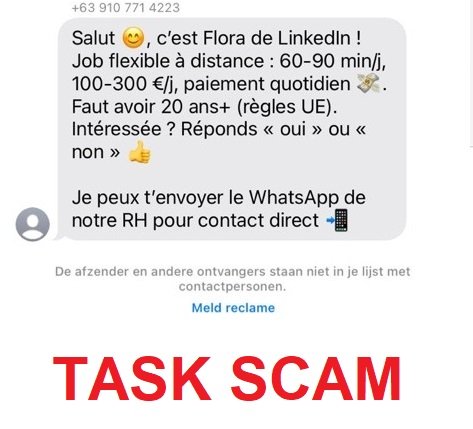In recent weeks, we have received reports from people who have been scammed by fake assignments or task scams. Victims worldwide are losing more and more money to this type of fraud. Always be wary of offers or proposals to earn money quickly.
A task scam is a type of fraud where you are led to believe that you can earn money from home by completing simple tasks, such as writing reviews, downloading software or liking products or services. The scammers pretend to be a real company or employment agency. They approach you by phone, WhatsApp, social media or email.
At first, it seems legitimate: you receive a message from someone recruiting you, a short 'training' session, and you even receive some money in your account. But this is all to gain your trust. Soon, they ask you to deposit money to continue working or to release your 'earned money'. If you pay, you will never see that money again.

How can I recognise it?
Look out for these signs:
- You are offered a job or task by someone you don't know.
- Scammers pretend to be a well-known company or employment agency.
- They ask you to add their phone number to your contacts and respond via WhatsApp.
- The job sounds too good to be true: little work, high pay, no experience required.
- They ask you to transfer money first, supposedly to activate your account or to access your salary.
- In the beginning, you sometimes receive real money, but then you have to pay more and more.
- You are told that you have not worked enough or that you have to pay to avoid a 'fine'.
- You supposedly build up a large credit balance, but you never get paid.
How can I prevent this?
These tips will help you avoid task scams:
- Do not respond to unsolicited messages or phone calls about work.
- Never pay to get paid. Real jobs never ask for payment in advance.
- Don't trust it if you have to pay money to be allowed to work.
- Do not add unknown numbers to your contacts, not even on WhatsApp.
- Always search online for other people's experiences with that company or number.
- Do not share personal or financial information via social media, email or chat apps.
What should you do if you are a victim?
Have you been scammed? Don't be ashamed. It happens more often than you think. Do this:
- Stop all contact with the scammer immediately.
- Collect evidence: take screenshots of conversations, websites and payments.
- Report it to the police or via consumerconnect.be
- Have you transferred money? Contact your bank as soon as possible.
- Talk about it with friends and family. This will help prevent them from becoming victims too.
